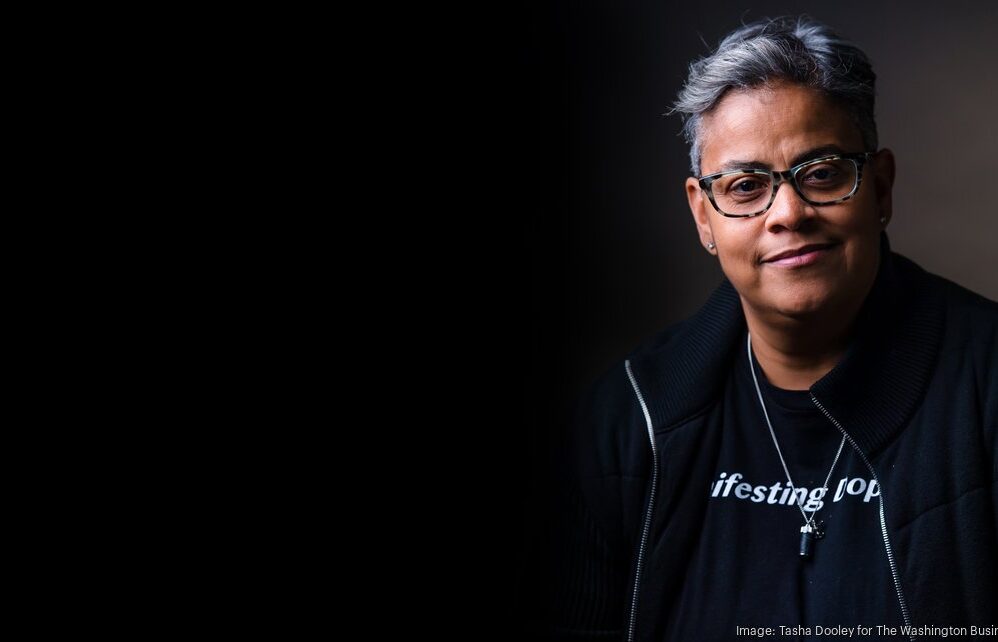BUSINESS JOURNALS: Melissa Bradley of 1863 Ventures says there are stark differences between D.C.’s fund and others now facing discrimination lawsuits. Melissa Bradley is the founder and managing partner of D.C.’s 1863 Ventures.
D.C. has launched the third iteration of its Inclusive Innovation Equity Impact Fund at a time when programs targeting the socially disadvantaged are under attack, but the fund’s manager, Melissa Bradley of 1863 Ventures, said she is confident the fund won’t face legal challenges because its eligibility criteria is not solely based on race.
Launched in 2022, the Inclusive Innovation Equity Impact Fund provides funding to early-stage companies that may not qualify for traditional financing. Mayor Muriel Bowser announced the opening of applications for its third round on Monday, the first day of D.C.’s 8th annual Startup Week.
The fund is not race-based, though many prior recipients are people of color. To be eligible for funding, a business must be D.C.-based and be least 51%-owned “by an individual who is — or a majority number of individuals who are — economically disadvantaged or has been subjected to racial or ethnic prejudice or cultural bias,” according to a 2022 news release from the mayor’s office.
In the wake of the U.S. Supreme Court’s ruling that severely curtailed the use of affirmative action in college admissions, some worry that such criteria could expose the fund to court challenges. After all, the same group that filed that suit against Harvard University and the University of North Carolina, the American Alliance for Equal Rights, is now suing the Fearless Fund, an Atlanta fund that administers grants to startups run by Black women. As it did in the affirmative case, the group claims that giving preference to people based on race violates the equal protection clause of the U.S. Constitution.
Bradley has denounced the suit and was one of 70 heads of venture funds who signed an open letter in August condemning it.
Still, during a fireside chat at a Startup Week event with Sybongile Cook, director of business development and strategy in the Office of the Deputy Mayor for Planning and Economic Development, Bradley said D.C.’s $2 million fund will not be derailed by a lawsuit because it’s providing venture capital funding, not grants, to eligible applicants.
“Knowing the lawsuits, they are not an attack on the venture capital industry, they are an attack on the grant-making industry,” Bradley said to the packed crowd Monday on the sixth floor of the National Union Building in Northwest D.C.
Moreover, she said, eligibility is not based on race. Rather, the fund is targeted to people who have been historically underserved and requires applicants to prove in writing that their business is unable to obtain conventional financing or cannot reasonably be expected to qualify for financing under the standards of commercial lending.
“For many of us that have been doing this for a long time, the goal was not to have funds just for Black and brown people,” said Bradley, whose 1863 Ventures is a fund and accelerator that supports underserved entrepreneurs. “It was to be able to demonstrate to the rest of the world that we have viable businesses.”
Cook’s conversation with Bradley was titled “Invest in D.C.” and touched on a wide range of topics, including what Bradley sees as the opportunities and challenges in D.C.’s startup scene, particular for founders of color.
About half of all businesses in the U.S. fail within five years, according to the U.S. Bureau of Labor Statistics, but Bradley noted that businesses owned by Black and brown entrepreneurs last at least 8.5 years, according to 1863 Ventures’ own research. In her mind, that’s proof that businesses owned by people of color are resilient.
Bradley also points to the success of the D.C. chapter of BLCK VC, a community-building organization for Black venture capitalists, as an example of the growth of the Black startup ecosystem in Greater Washington. When the D.C. chapter started it had only two members; now there are 50, Bradley told the audience.
“I think that there is a lot of entrepreneurial talent in D.C. that has just been overlooked because it doesn’t look like and match what we see on TV,” Bradley said.
Nonetheless, access to capital remains a persistent problem for founders of color, and Bradley implored the investors and lenders in the Startup Week audience to take a bit more risk when it comes to funding.
“For investors, you got to write a damn check,” Bradley said. “I think when it comes to D.C., some of my fellow investors’ risk aperture is way too small.”
She advised lenders to stop making loan applicants “jump through unnecessary hoops.”
“We’ve had many conversations with banks who require all these things in life, but that has nothing to do with your underwriting criteria,” she said.
Bradley, a fixture in D.C.’s startup scene for decades, also offered a fair bit of advice to founders themselves, starting with this gem: Surround yourselves with people who will serve as “a pillow” and “a mirror.”
The pillow is somebody who will support you unconditionally and “say it’s going be OK even though you know damn well they’re lying,” Bradley said.
The mirror is somebody who will tell you the reality of the situation and won’t sugarcoat it. “You need somebody who’s a mirror that says, ‘That’s the dumbest shit I’ve ever heard. You need to go try again.’”
Finally, for founders who have made it, her advice is to pay it forward. If you are successful, make sure you’re bringing another less-experienced founder along with you.
“The idea here is that we are making the door and the room for opportunity a lot larger,” Bradley said.










